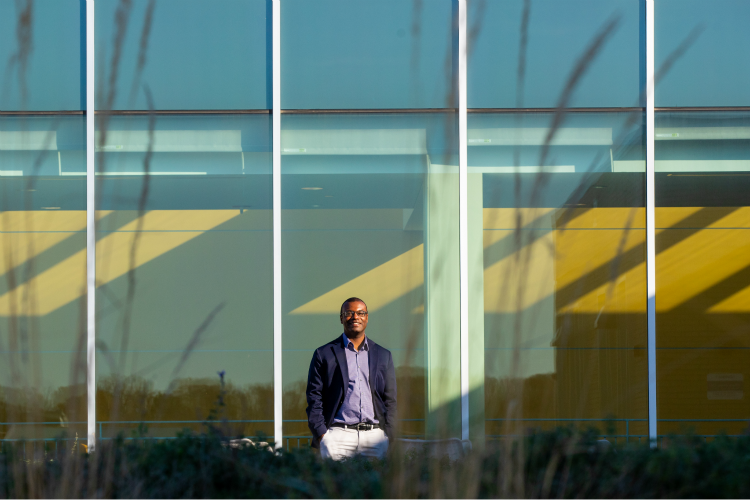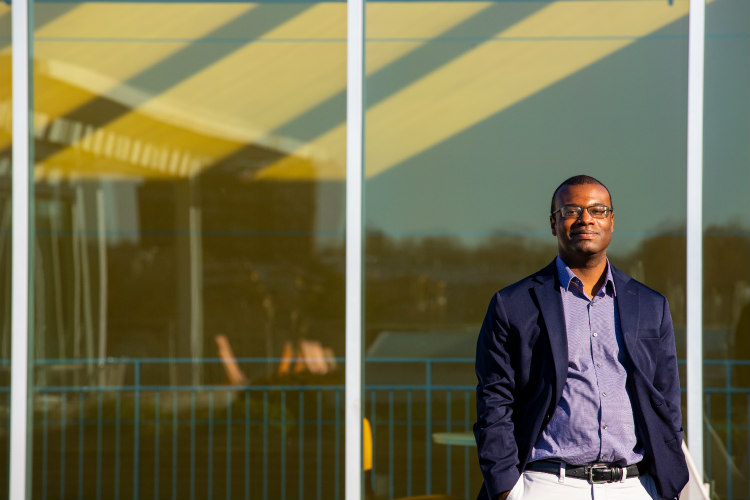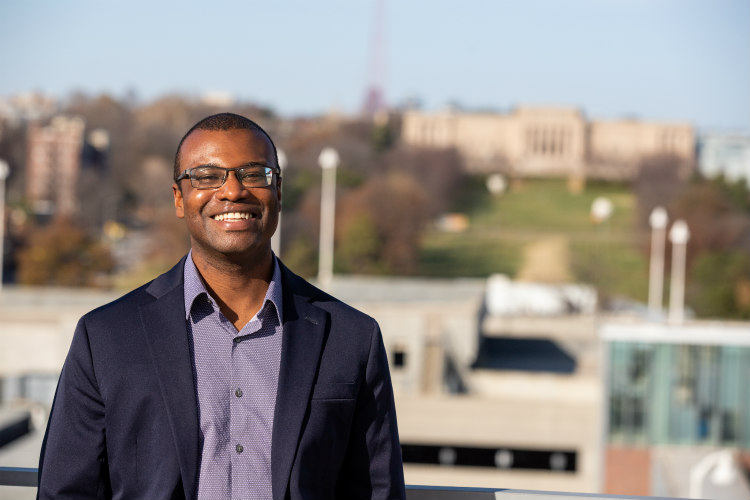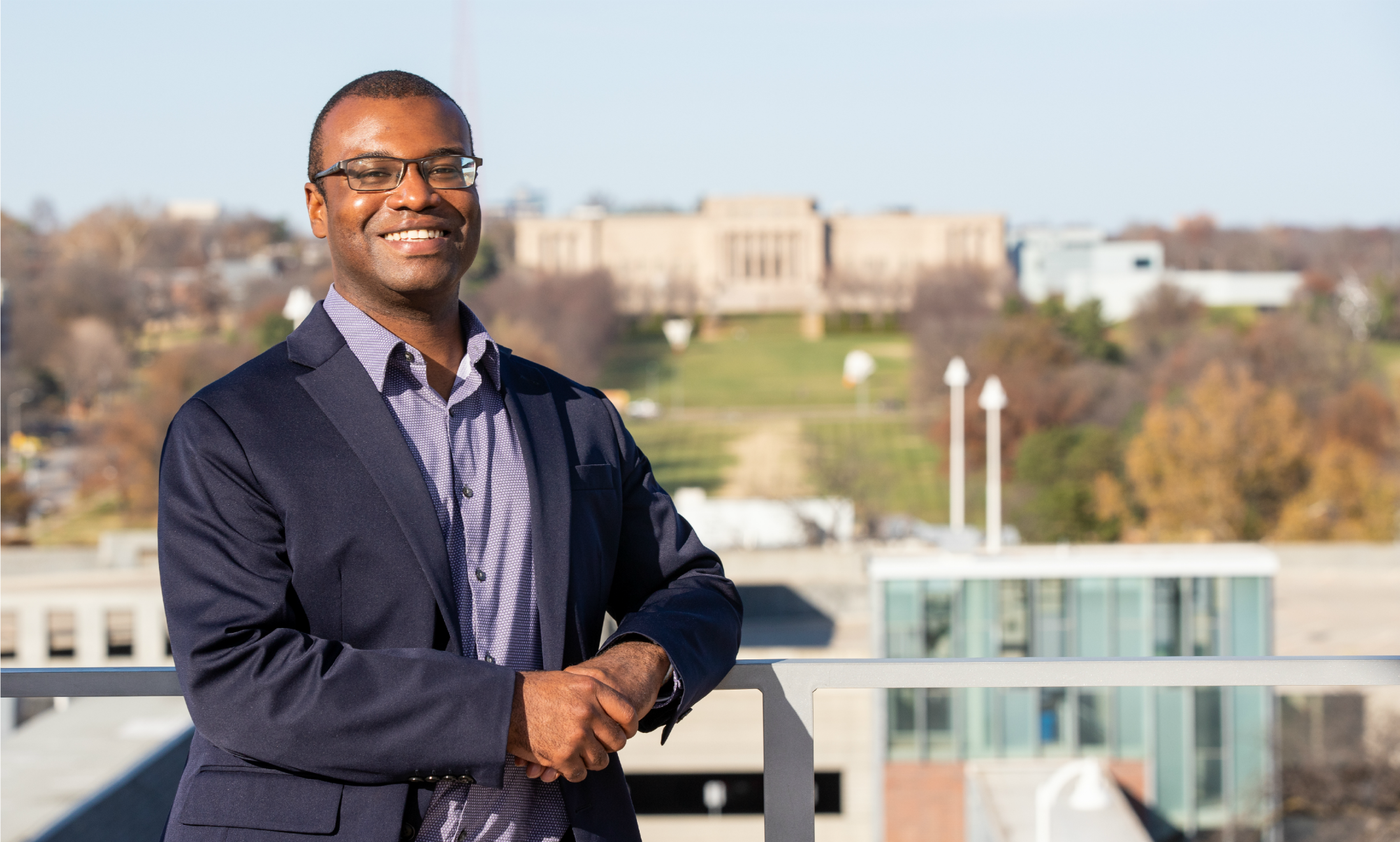The Black Excellence At UMKC series helps to increase awareness of the representation of diversity and equity on campus and show a visible commitment to the inclusion and recognition of Black faculty and staff. This series celebrates and highlights Black and Roo faculty and staff working behind the scenes and on the frontlines to help our university achieve its mission to promote learning and discovery for all people at UMKC and the greater Kansas City community.
Antonio Byrd, assistant professor of English language literature, was attracted to the familiarity of UMKC. It’s here that he’s able to pay forward the experiences he had as a student, connecting with faculty and learning from his peers, from the opposite perspective.
On a mission to achieve social justice through digital literacy and technology, he’s spent the past few years studying how racially marginalized people create their own means for access through computer programming. It’s a cause that struck him as a doctoral student at the University of Wisconsin-Madison, and one he’s dedicated his research and community volunteerism to help stop.
We sat down with Byrd to learn more about his recent transition to Kansas City and his efforts to achieve racial and economic equity through digital technologies.
"Coming to UMKC felt like coming to something familiar."
Name: Antonio Byrd
Title: Assistant professor of English language and literature
Tenure: 2019 - present
Hometown: Prattville, Alabama
Alma Mater and Degree Program:
University of Wisconsin-Madison; Ph.D. in Composition and Rhetoric
Auburn University at Montgomery; M.A. in Liberal Arts | B.S. in Secondary Education
Why did you choose UMKC as the place to grow your career?
I was drawn to the growing interest in digital scholarship here at UMKC, and that faculty across departments are eager to collaborate on a lot of different digital projects. I’m happy to join other faculty who have the same kind of desire to do more with digital technology. I hope our working together can blossom into practical tools and policies that address racial inequality in Kansas City.
What do you enjoy most about UMKC?
The students! During my campus visit in the spring of 2019, UMKC reminded me of the best qualities of Auburn University at Montgomery. It delights me to know that students share a large space in the hearts of my English department colleagues, who have a lot of enthusiasm for teaching and mentoring.
One of the best memories of my undergraduate days was connecting with other English majors and with my professors. That relationship building was formative for my learning and my becoming into the person I am now. I would not have pursued my doctoral degree if not for those relationships. Coming to UMKC felt like coming to something familiar.
In the short time I’ve been here, I’ve encountered a lot of ambitious students who aspire to do well and pursue projects that matter to them. My students are energized when I say, “Yes, that’s a project you should totally do!” At the same time, I feel challenged to do more as a teacher: better course design, better teaching strategies, better content.

What classes do you teach?
I teach 300-level and 400-level advanced rhetoric and writing courses, which includes courses like Theory and Practice of Composition, Rhetorics of New Media and Multimodal Rhetorics and Writing. I’m also on a mission to get more students to learn professional and technical writing.
I try to make my courses workshop- and project-based and a space where students generate knowledge from each other and the course material. We discuss how writing, rhetoric and technology contribute to oppression and racism while also encouraging students to flip the script and use writing, rhetoric and technology for liberation and survival.
I’m hoping that by the time they get tired of taking classes with me, students understand that linguistic racism persists, and as English majors, they have a duty to reveal this invisible ideology in their professional and personal lives, as well as a duty to resist participating in that racism themselves.
"I’m interested in knowing what my students are interested in."
What sparked your interest in researching race and equity in digital literacy?
While I was pursuing my doctoral degree at UW-Madison, I discovered literature published by other researchers arguing that coding is a type of writing that may eventually become required for everyday living, similar to conventional reading and writing. That made me think about the implications for putting more computer science curricula in schools.
Education in the United States is inherently unequal and designed to leave Black people out, so incorporating computer science into an already unequal education system recreates existing inequalities and continues to perpetuate a racial class system in and around computer programming. Because getting more people to learn coding was relatively new, I thought that maybe this is an opportunity for me to help stop that from happening. I wrote my seminar paper on this, and that work was foundational for my research on Black adults learning coding in a computer code bootcamp.
That question combined all of my concerns: literacy, race, technology and education.
What have you been able to accomplish in your research?
I published two articles from my dissertation! “Between Learning and Opportunity: A Study of African American Coders’ Networks of Support” in Literacy in Composition Studies and “‘Like Coming Home’: African American Adults Tinkering and Playing Toward a Computer Code Bootcamp” in College Composition and Communication. The article published in Literacy in Composition Studies was recently nominated for the Best of the Journals in Rhetoric and Composition book series.
I’m glad that the stories Black people in the computer code bootcamp where I did my research shared with me are out in the world and people are receptive to them. I’m currently working on a book project that I hope will make their stories more public and drive conversation about coding, race and equity nationwide, and especially in the Kansas City area.

How do you connect and establish relationships with other Black faculty and staff in other units and departments?
The moment I arrived at UMKC, I knew I wanted to be involved with the department of Race, Ethnicity, and Gender Studies. My associate chair, Laurie Ellinghausen, introduced me to Vice Chancellor Brandon Martin, Ed.D. and department chair Toya Like, Ph.D., who have been great for discussing ways I can tune into REGS and connect with students of color, faculty and staff. The Black & Roo Faculty/Staff Association, the affinity group for Black faculty and staff under the umbrella of the Division of Diversity and Inclusion, is another organization I will participate in. Now that I’ve settled into the groove of teaching and research here, I’m ready to connect with my own people.
"If something keeps you up at night, you should probably make that your research!"
You’re fairly new to the Kansas City area, have you had an opportunity to get involved in the community yet?
Yes! I’ve been working with Code for KC since I moved here. Code for KC is a Code for America brigade that brings together community members with a diversity of skills to work on civic tech projects that benefit Kansas City. The latest project I’m working is Re.Use.Full, a website that connects people with stuff to nonprofit organizations that need it.
I’ve done a variety of tasks with the website, from writing web content to strategizing social media marketing. The website is great for building an intimate relationship between people who have stuff to donate and community organizations. Of course, I have to do a shameless plug and encourage people to check it out and consider donating to our Give Butter campaign!

Describe your mentoring relationships with students.
I’m interested in knowing what my students are interested in. When I introduce major writing projects to my students, I always ask them to pursue what they find curious, interesting, scary, etc. Writing begins with that personal perspective and I like to support them in that work with comments. I hope the comments help them see their work differently; at least that’s often been my experience when mentors and colleagues read my drafts. I also try to be a resource. If there’s something they want to do academically or professionally, I try to point them to the right resources or people that can help get them to where they need to be.
What is one piece of advice you’ve learned as a newer faculty member that you’d pass on to someone else looking to pursue their research career?
I find it interesting to learn how scholars get into the work they do. That’s not always talked about, so I hope my own journey encourages readers in graduate school or thinking about graduate school to enjoy the ride and use their personal concerns to guide their decisions about what to research. If something keeps you up at night, you should probably make that your research!
What is one piece of advice you’d give a student wanting to follow in your footsteps?
I don’t think they should lock themselves into doing just one thing. The skills they learn in academia can actually transfer to similar jobs outside of academia. I read an article when I was doing research on doctoral education and the writer observed that the world is very interested in you, even though you have more interest in academia. Your analytical skills, your written communication, your collaboration with others and your knowing how to learn is needed in so many places outside of academia. Whatever you do, you will always have value.

